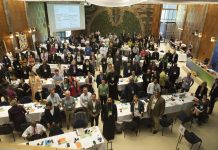Thursdays in Black ambassadors are organizing a series of Bible studies, beginning 5 August, that will help people reflect on and respond to gender-based violence. The first series of 6 reflections is being launched to recognize National Women’s Month in South Africa, and particularly Women’s Day in the country – August 9.
The reflections will address critical topics that arise in societies and Christian communities that contribute to or respond to gender-based violence. The reflections will also provide diverse perspectives from the global ecumenical fellowship. The hope is that they can be used by individuals and churches, and will help people listen to the word of God, and apply their faith and vision of justice, peace and love in their contexts today.
The first in the series, by Susan Mark Zira from the Church of the Brethren in Nigeria, will be on the theme “Speak Out Boldly,” based on Numbers 27:1-11. A reflection will be shared each week and upon its completion, the series will be compiled into a book available online for group study.
“Become passionate and unrelenting agents of social change”
The start date of 5 August is four days before National Women’s Day in South Africa, a national public holiday on 9 August commemorating the 1956 march of approximately 20,000 women to the Union Buildings to protest the Apartheid Pass Laws. The whole month of August is also declared Women’s Month.
“The significance of Women’s Day therefore is in celebrating and honoring those women from all walks of life- who came together to fight for their undiminished humanity,” states Bishop Purity Malinga, Methodist Church of Southern Africa. “It is those 1956 women on whose shoulders we as South African women stand. They embodied the dictum and proverbial wisdom: ‘You strike a woman, you strike a rock.’
Bishop Purity continues, “More than that however, this day and month draws attention to the issues that women of this nation and of the world continue to face – issues that dehumanize them. It is used to challenge the oppressive systems and galvanize women (and men) to work towards gender justice and equality. The struggle for gender equality is of course a daily struggle for women, but this day and month help in putting a particular emphasis on the issues women and girls face.
In December 2019, a World Council of Churches Pilgrim Team visited South Africa. The pilgrimage was motivated by concerns over unacceptable levels of gender-based violence and femicide in South Africa, and violence toward foreign nationals.
Pilgrims listened to the voices of those directly affected, and migrants, refugees and internally displaced persons shared experiences of physical and human rights abuses.
“Ours is a country that is most unsafe for women and girls,” states Bishop Purity. To overcome this scourge, all sectors of society have to consider their role. The church cannot deny its contribution to entrenching patriarchy which degrades women and turns them into objects for men- which is the root of gender-based violence and femicide. It is therefore, imperative that the church plays a leading role in fighting this scourge if it is to be overcome. Church leaders (male and female) must be visible and vocal in declaring gender-based violence and femicide the sin that it is – a sin against God in whose image all humanity has been created. Church leaders must be at the forefront of the re-interpretation of Scripture so that it gives life to both women and men; transforms our thinking and ultimately our behavior.”
She concludes, “Women’s Day and Women’s Month serve as important reminders to our society to become passionate and unrelenting agents of social change.”
WCC, oikoumene.org















